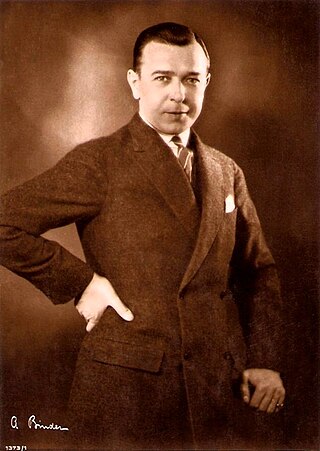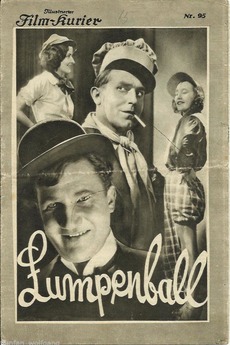
My Wife Makes Music is an East German musical film directed by Hans Heinrich. It was released in 1958, and sold 6,052,050 tickets. It was shot at the Babelsberg Studios in Potsdam. The film's sets were designed by the art director Oskar Pietsch.

Georg Alexander was a German film actor who was a prolific presence in German cinema. He also directed a number of films during the silent era.

Evelyn Holt was a German actress.

Alkohol ('Alcohol') is a 1919 German silent drama film directed by Ewald André Dupont and Alfred Lind and starring Wilhelm Diegelmann, Ernst Rückert, and Georg H. Schnell. The film was begun by Lind but finished by Dupont. It was his first major melodrama, and represented a breakthrough in his career. The film's theme and setting foreshadow much of his later work. It was one in a series of "Enlightenment films" examining social issues, which were produced around the time. It premiered at the Marmorhaus in Berlin.

Josefine Dora was an Austrian stage and film actress. She appeared in over 100 films, generally in supporting roles such as in The Virtuous Sinner (1931).

Somnambul is a 1929 German silent horror film directed by Adolf Trotz and starring Fritz Kortner, Erna Morena and Veit Harlan. The film is set against the backdrop of spiritualism. The Berlin clairvoyant Elsbeth Guenther-Geffers appeared in the film. The film's art director was August Rinaldi.

The Weavers is a 1927 German silent historical drama film directed by Frederic Zelnik and starring Paul Wegener, Valeska Stock and Hermann Picha. The film is based on the 1892 play of the same title by Gerhart Hauptmann based on a historical event. The film's art direction was by Andrej Andrejew.

Marriage in Trouble is a 1929 German silent drama film directed by Richard Oswald and starring Elga Brink, Walter Rilla and Evelyn Holt. It was shot at the EFA Studios in Berlin. The film's art direction was by Franz Schroedter. A man considers leaving his wife for another woman, but eventually decides against it. The film was based on a French novel by Georges Antequil.
Misled Youth or Youth Gone Astray is a 1929 German silent drama film directed by Richard Löwenbein and starring Fritz Alberti, Erna Morena, and Dolly Davis. It was one of a number of enlightenment films during the Weimar Era that addressed the issue of juvenile delinquency. The film's art direction was by Hans Jacoby.
Crucified Girl is a 1929 German silent drama film directed by Jacob Fleck and Luise Fleck and starring Valerie Boothby, Gertrud de Lalsky and Evelyn Holt. It was shot at the Johannisthal Studios in Berlin. The film's art direction was by Artur Gunther and August Rinaldi.

His Majesty's Lieutenant is a 1929 German silent romance film directed by Jacob Fleck and Luise Fleck and starring Iván Petrovich, Agnes Esterhazy and Georg Alexander. It was shot at the Staaken Studios in Berlin.
The Story of Dida Ibsen is a 1918 German silent drama film directed by Richard Oswald and starring Anita Berber, Conrad Veidt and Werner Krauss. It is an adaptation of Margarete Böhme's 1907 novel of the same title, a sequel to her best-known work The Diary of a Lost Girl. It was one of a series of enlightenment films made by Oswald during the period.
Whom the Gods Love is a 1942 Austrian historical musical film directed by Karl Hartl and starring Hans Holt, Irene von Meyendorff, and Winnie Markus. The film is a biopic of the Austrian composer Wolfgang Amadeus Mozart. It was made as a co-production between the giant German studio UFA and Wien-Film which had been set up following the German annexation of Austria. The film was part of a wider attempt by the Nazis to portray Mozart as an authentic German hero. Like many German biopics of the war years, it portrays the composer as a pioneering visionary.
Walter Wassermann was a German screenwriter, director, and actor. He directed one film and acted in seven during the silent era.

Painted Youth is a 1929 German silent drama film directed by Carl Boese and starring Toni van Eyck, Wolfgang Zilzer, and Olga Limburg. It was shot at the National Studios in Berlin. The film's sets were designed by Karl Machus.

Rag Ball is a 1930 German comedy film directed by Carl Heinz Wolff and starring Harry Frank, Irene Ambrus, and Kurt Lilien. The title refers to a costume ball in which the guests turn up in tatters and rags.

How Shall I Tell My Husband? is a 1932 German comedy film directed by Reinhold Schünzel and starring Renate Müller, Georg Alexander, and Ida Wüst. It was shot at the Babelsberg and Tempelhof Studios in Berlin. The film's sets were designed by the art director Werner Schlichting. Location filming took place at Heringsdorf on the Baltic Sea. It premiered at the Gloria-Palast in Berlin.

Flirtation is a 1927 German silent drama film directed by Jacob Fleck and Luise Fleck and starring Fred Louis Lerch, Henry Stuart and Jaro Fürth. It was shot at the Johannisthal and EFA Studios in Berlin. The film's sets were designed by the art director Jacek Rotmil. It was based on a play by Arthur Schnitzler, which was turned into a 1933 sound film Liebelei by Max Ophüls.

A Woman Like You is a 1933 German comedy film directed by Carl Boese and starring Liane Haid, Georg Alexander, and S. Z. Sakall.It was shot at the Bavaria Studios in Munich and on location in Garmisch-Partenkirchen. The film's sets were designed by the art director Ludwig Reiber.

Our Emperor is a 1933 Austria period comedy film directed by Jacob Fleck and Luise Fleck and starring Karl Ehmann, Alfred Neugebauer and Susi Lanner. It takes place during the reign of Franz Joseph I of Austria. Location shooting took place in Bad Ischl and at the Burgtheater and Lainzer Tiergarten in Vienna.















